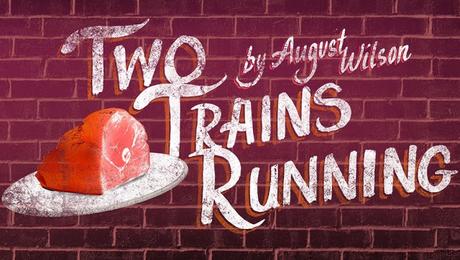
Buy the play here.
Though the Black Power Movement and their various rallies and protests is only a mere background element in the work, August Wilson’s Two Trains Running is a refreshing depiction white exploitation, racial conflict, oppression, hopelessness and the humor and love that’s used to counteract all of that within an urban black community. The plausibility behind all of these character’s hopes and desires lies in not only conviction in their dialogue, but also in each of the character’s ability to keep pushing for what they want, even if their logic is not always rational.
Regardless of whether it is love, money, success, respect or ham that they want, everyone has something to strive for and it is something they’re consistent at doing. Our lead, Memphis, is fighting a system that he doesn’t quite know that’s there in order to get the money he deems is acceptable for his restaurant from the white people in charge. The mentally-challenged, Hambone, has been striving for ham for questionable reasons from the local white butcher for the last nine-and-a-half years and seemingly acts as a foil to Memphis as they both are actively demanding what’s due from white people in higher positions of power. Though Hambone’s need for ham acts as a bit of a comedic relief to the play, after his death, all of his activism in the name of ham is illustrated to be not so different than Memphis’ in regards to the situation with his money. Also similarly to Hambone’s persistence in getting his ham, Memphis’ overtly driven personality is also what driven him in his struggle against the white city developers, but it’s also the added ambiguity in different elements of their many of their rationalizations that also ties them together. For example, we don’t know why Hambone strives for ham from the white butcher nor is it ever revealed even after his death. As for Memphis, while he believes that people are free agents that are able to do as they please, for whatever reason, he also cannot comprehend just how institutionalized racism still inhibits and limits specifically black people from doing what they want to do. Even though he acknowledges that white people owe him certain things, it is solely due to his own sense of entitlement, rather than one from a political standpoint that sees the higher, white forces working against black people like himself.
A young, politically-curious, ex-convict named Sterling wants the love of Risa, one of Memphis’ workers, along with large amounts of money as does his comrade, Wolf, who runs an illegal lottery service from Memphis’ restaurant. While Wolf’s work brings him some uneasiness due to the unfairness in how the winnings are distributed rather than its illegitimacy or the fact that it contributes to the exploiting the impoverished people of his town, Sterling strives for a job. Though men like Memphis assume that men like Sterling can’t find work because they’re lazy, the play insinuates that it’s quite hard for black people to find work. His unbalanced nature in where both his spiritual and political convictions lie on top of his criminal record is also what inhibits him from being able to hold down a stable job, but, of course, he doesn’t realize this as he jumps between wanting to fight for Black Power, while also listening to the likes of Prophet Samuel, Aunt Ester and also Malcolm X. It’s revealed that Rise cuts herself as a way to protect herself against men from viewing her in a sexual light and for the most part, it works. Both Sterling and Wolf’s infatuation with her seems to stem from something other than her body. However, instead of finding some way to say physically that or even listening to what she wants, Sterling continuously pines after without a second in between his rapid flirtatious dialog for Risa to get a word in otherwise, and Wolf remains silent. Risa’s part in the play in minimal, but it does expose another intersectional level of oppression in their world as not only does she have to deal with the problems that come with being black, she also has to deal with the problems that come with being a woman. Though she believes that mutilating her body is an easy fix for the issue that she has with men sexualizing her, she still has to deal with men reducing her character to that simply of a woman whose sole purpose is to cook, clean and get married. However, she doesn’t seem to see many of these problems are real issues as she ends up getting together with Sterling even though he is the one who made a majority of the sexist statements towards her. Though Loy Alexandra of Livin' Like Maya reasons that Risa’s her silence could reflect those of “the women who walk about silently carrying the pain that life has thrown at them” as well as Wilson's inability to conceptualize the struggles of womanhood, it could also reflect the ignorance Risa has of her own female oppression at the hands of men like Sterling.
Though all these things that these characters are striving for what seems like very straight-forward desires, it is the way that these characters view the world around them and societal institutions that are inscribed within that world, that inhibits them from fully stepping up to the plate to take ahold of their dreams. Though they seem to really know what they want and ultimately keep repeating it to themselves and others, it is hard to decipher whether they’re trying to prove something to themselves or someone else through these achievements. It's only through them realize just exactly what they're fighting against and for what reasons that they can realize this, but unfortunately for Wilson's characters, they have a long way to go.

